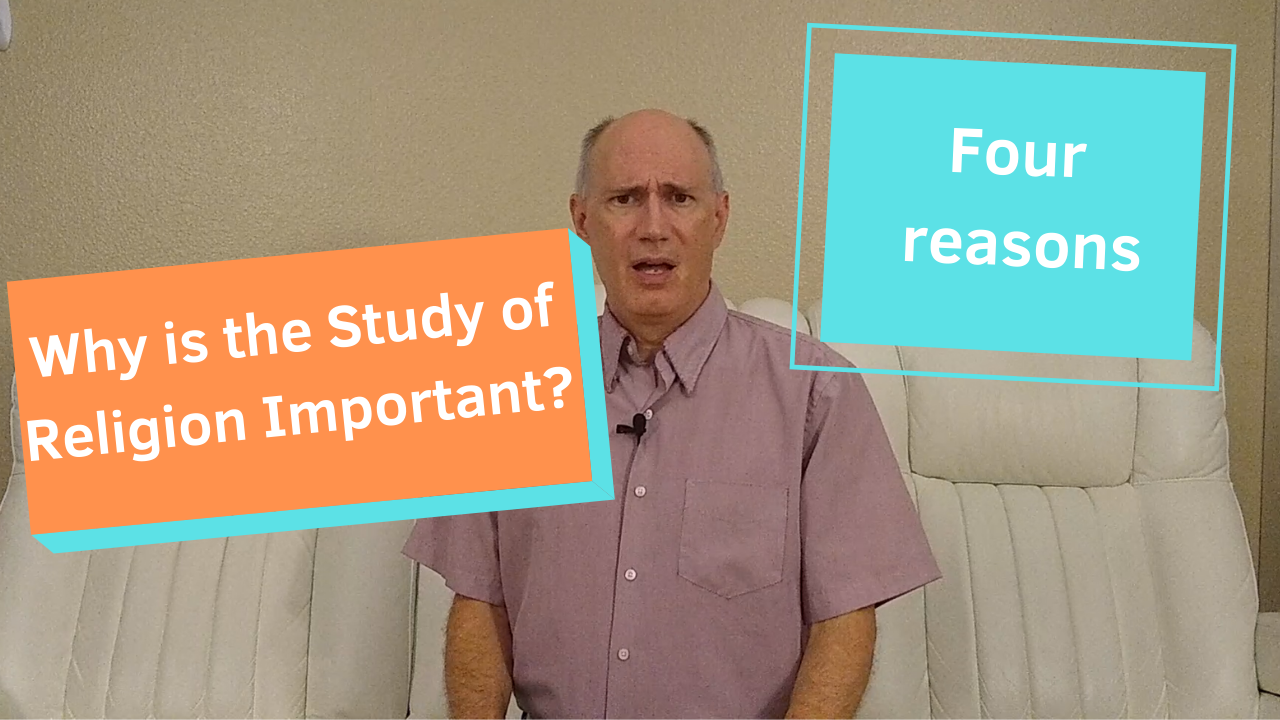10/21/2020 – Why is the Study of Religion Important?

Why is the study of religion important? You wanna find out? You wanna find out? This is TenOnReligion.
Hey peeps, it’s Dr. B. with TenOnReligion. Former Secretary of State John Kerry is quoted as saying:
“I often say that if I headed back to college today, I would major in comparative religions rather than political science…because religious actors and institutions are playing an influential role in every region of the world…”
Why did he say this? It’s the age-old phrase: knowledge is power. Religion is one of the most powerful social and cultural forces in human history both good and bad. It has wreaked havoc and horrible devastation over the course of time all around the world. It has also been a source of profound comfort and relief over the course of time all around the world. Religion is in every country and for millennia has been integral to human cultures. So learning about religions and the cultures that produced them will contribute to the moral, intellectual, emotional, and even spiritual self-knowledge of anyone’s development.
Now this isn’t just about tolerance. Think about the word “tolerance” for a moment. What does it really mean? Go hang out with your best friend, significant other, bff, close family member, etc. this weekend. Sit them down, get a really serious tone in your voice, and say, “I have something really important to tell you. I just want you to know – I tolerate you.” See what they say. “Um, thanks, I guess…what’s wrong with you?” See, do you want to be just tolerated? So let’s just stop talking about toleration and start using another way to describe what we really mean. Back to religion.
Whether we like it or not, individuals and communities are inspired by their religious identities to motivate their action in the world. Those actions can have positive effects on the world, such as social outreach or providing a sense of community to adherents, or negative effects, including intolerance or violence against others. The fact remains, however, that their actions are often rooted in their religious views. The primary focus of religious studies is to expose differences in those worldviews so that we might understand the beliefs and practices of a wide variety of people. Different religious groups imagine the world differently, and that affects how they respond to things that go on in the world today.
The academic discipline of religious studies does not train students to be Catholics or Buddhists or Jews any more than political science trains students to be Democrats, Republicans, or Libertarians; or a baseball coach trains players to be Yankees or Cubs fans. [Did somebody say Cubs fan? (while wearing Cubs hat & shirt)]
But the most important attribute that the academic study of religion offers is even more vital and far more concrete: the ability to understand others. In a world in which we are increasingly exposed to differences of all types, what could be a more vital skill for navigating the future?
Let’s get into some more details.
Even if there is increasing acceptance for those of other faiths, there is still a very high level of misunderstanding and ignorance about religion, specifically religious commitments and practices other than our own, not to mention a very large sector of our population that harbors an intense conviction that only their own religious tradition is valid or true and on that basis the study of other religions is unnecessary or worse yet, some sort of [voice] evil demonic force. That was ridiculous. We desperately need instruction, at all levels of our educational system, that teaches people about religion as a global and human reality.
"Religion" means the many ways in which human beings around the globe and across the centuries have dealt with the meaning of life and the values by which to order one's personal life, one's family life, one's social organization, and one's dealing with other human beings. This could be both within and without one's own particular religious, national, racial, ethnic, linguistic, or socioeconomic group.
So why study religion? There are four crucial reasons which will result in three outcomes. First, the four reasons.
- Real religion, not stereotypes. We need policymakers and politicians who have some grasp of the actual religious dimensions of life in other nations and cultures, so that they do not proceed ignorantly to assume (or worse yet, act on) popular and mistaken generalizations about what "all Hindus," "every Jew," or "most Muslims" believe or do. Religious generalizations and stereotypes are not good when we make policies for our local schools and communities much less laws for the entire country.
- Religions are different. We need people in careers, jobs, and in every walk of life who have some grasp of the fact that their own value systems are not unique and do not necessarily apply to everyone else in the world. Most clothing is not a one-size-fits-all. Neither is religion. Religions ask different questions. For example, trying to apply the answers of Buddhism to the questions of Islam is like trying to put a square peg in round hole. It doesn’t fit.
- Understand the context of words. We need people of good intention in all professions to know enough about the varied religious communities both in our neighborhoods as well as around the world to understand the danger of language that refers simplistically to "jihad" or "polytheism" or "legalism" as things other people live by and believe. Words have many meanings, and we need to learn the historical and cultural contexts of those words. Especially religious words. The word “God,” for instance, is a flexible term, and means a lot of different things to a lot of different people.
- Finally, other people are human, just like you. We need people to know enough to accept, to understand intelligently, and to feel intrinsically, that millions of others—be they monotheists, polytheists, humanists, atheists, or whatever—are just as human as they are. We need to realize that they are at least as moral, as intelligent, and as faithful to their own traditions and values as we are to ours.
These are the four crucial reasons:
Real religion, not stereotypes; religions are different; understand the context of words; other people are human just like you.
These four crucial reasons have at least three good outcomes:
First, acceptance: these reasons would engender increased acceptance of the "other," not just tolerance, because understanding is itself a good and invigorating thing.
Second, work together: these reasons would engender increased ability for us to work together to solve the urgent global problems we all face, such as hunger, health care, climate change, and slowing the ruin of our earthly habitat.
Third, this is going to be a tough one for some of you, no religious coercion: these reasons would engender increased awareness of the historical fact that religious coercion has consistently proved futile, and worse—it has been the source of horrible violence throughout history, so much so it cannot even be calculated. For example, Islam teaches in the Qur'an that "there is no compulsion in religion." This needs to be taken far more seriously by all religions. Forcing someone to be “your religion” rarely, if ever, ends well.
So the three good outcomes are: acceptance, work together, and no religious coercion.
The study of religion is not just for religious schools, seminaries, and religion departments. We need the study of religion globally in every liberal arts or general education curriculum; in fact, we need it in every secondary school and even elementary schools with age-appropriate materials. The study of religion should be integrated within every school curriculum and every college curriculum in the twenty-first century, because knowing about and understanding religion are critical elements in dealing with a world which becomes more religiously diverse every day. Even if you’re not religious, most of the people in the rest of the world have been influenced by it one way or the other so it’s important that everyone learns about it. People are more in contact with differing worldviews and religious values systems, and more dependent upon those of other societies than ever before so we need to find ways to live and work together for the survival of our planet, let alone our species.
A final question. Are you comfortable working alongside people with different religious backgrounds? If not, why not? What do you think it would take to make that happen? That’s it.
I hope this vlog has helped you better understand this topic. Until next time, stay curious. If you enjoyed this, please like this video and subscribe to the channel. This is TenOnReligion.


